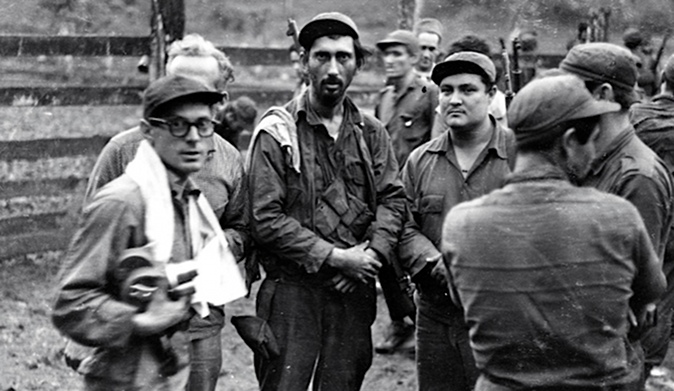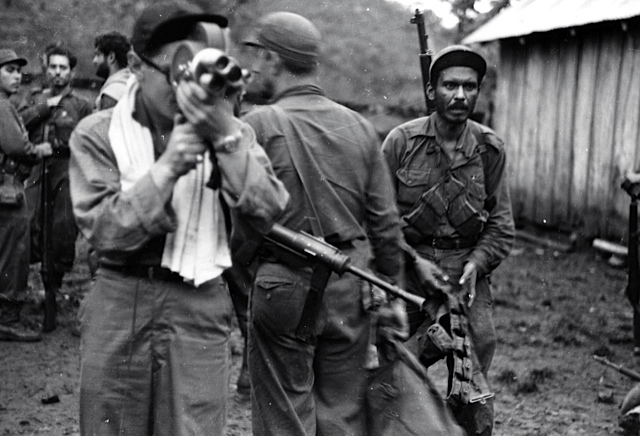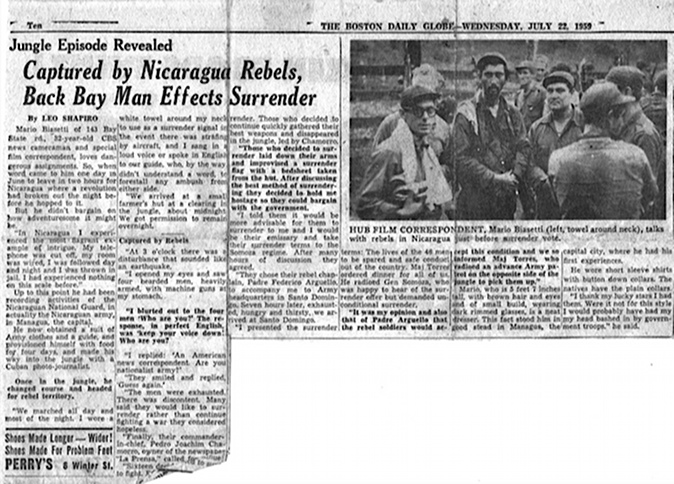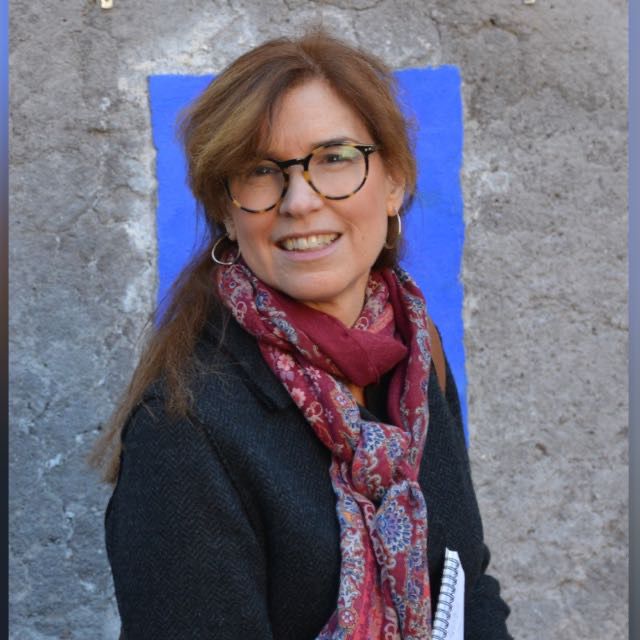
PART III – THE GLAMOUR AND GRIME OF A FOREIGN TELEVISION CORRESPONDENT
After proving his talent in Boston, CBS decided to send Mario off to the Sierra Maestra moutains to follow Fidel Castro, Che Guevara and the Cuban revolutionaries.
Mario left my mouth hanging open when he told me casually, “I interviewed Castro at least three times, he was a cowboy and a gentleman.”
Mario said Che Guevara would tease him saying “Tu habla spaghetti espagnolo.”
6) Bluffing your way through enemy lines… I know endless stories of journalists in war situations– from the Balkans to East Africa– using clever little tricks, bluffing their way through enemy lines, or government checkpoints. It is part of the job.
Mario was a pro at crossing enemy lines while he was working in Cuba. At one point-after Castro was in power- the foreign editor in NY called and said there’d been rumors of a landing by anti-Castro forces and asked Mario to check it out… His sources told him the Sierra Maestra that had been declared an OFF LIMITS area by Fidel Castro.
Mario got himself a mule, a guide, brought along his CBS cases and headed into the mountains. At every check-point he would greet the soldiers with, “Que tal Chico?” (How’s it going young man?) and when the soldiers asked him “Where are you going?” Mario would answer, “to see the boss, naturally.”
As he got close to the top of the mountain heavy gun fire broke out. Mario and his guide threw themselves in a ditch and waited until the shooting stopped. Soon after an army patrol found them and demanded to know what they were doing there as the area was OFF LIMITS. “I’ve come to interview el Presidente”, said Mario. The officer looked at his watch and said, “el presidente Fidel should be here in half an hour.”
Dozens of armed men toting all kinds of weapons were regrouping and officers yelled orders. Half an hour later a tiny 2-man bubble helicopter landed in a recently cleared patch near where Mario stood. Mario notes, “he was such a cowboy he always travelled in his bubble helicopter like it was his horse. He even took the bubble helicopter to come to the pool at the Hotel Nazionale in Havana where I always stayed.”
Fidel jumped out, noticed Mario filming and screamed, “What the F… are you doing here? Get off the mountain! NO, wait… I’ll be in Santiago in 4 days and I want to talk to you.”
“Si Señor”, said Mario, and left.
7) When you are surrounded by lots of armed men and their leader tells you to leave and not film, do it. You can only bluff so far, no story is worth your life.
Four days later in Santiago Mario got the interview with Castro in which the Cuban leader said he wanted to talk to President Eisenhower about tensions between the US and Cuba. “If the President is too busy I’d be willing to talk to the Secretary of State.” Castro told Mario.
Mario explains that it was well known in those days that Eisenhower spent lots of time on the golf course and Fidel wanted to add a subtle diplomatic dig by saying he’d talk to the Secretary of State, Christian Herter. Following the CBS News broadcast with Mario’s interview, Mario says the answer from the State Department was quick and undiplomatic: “If President Castro has anything to say we have an Embassy in Havana.” A diplomatic hand-slap for Castro.
Two days later Mario says two men showed up at Havana’s Hotel Nacional, hauled him to police headquarters where they photographed, fingerprinted him and then locked him up in a little room. All the while, thinking that there’d been a mistake, Mario kept repeating to his jailers, “When el Jefe finds out (Fidel, the boss) it’ll be your ass.” Little did Mario know that it had been Fidel that had ordered his expulsion from Cuba and that he be declared persona non grata.
The next day, Mario was driven at breakneck speed to Jose Marti airport and an hour later he arrived in Miami, never again to return to Cuba.
8) The old rule of getting back on the horse is true for TV journalists, you get kicked out a country, your film gets ruined, you miss the story… don’t worry, it happens to the best of journalists, get back up and try again.
Mario was persona non grata in Cuba, but the contacts he had made, the language and reporting skills he had acquired there were useful for his future work in Nicaragua.
CBS News sent Mario to Nicaragua, after Sandinista rebels coming from Cuba–the ones he had seen training in the Sierra Maesta– landed in the jungle of the Chontales region. The desk called Mario, “first available,” Landing in Managua, Mario took a cab and headed for the city. The driver told him machine gun fire had been going on all morning in the center of the city. And in fact, repeated short bursts of fire could be heard from inside the cab as they reached closer to town. Mario asked the driver to head in the direction of the fire but the driver refused. “I’m not crazy,” he said. But he agreed to take him close to where the shooting was and would drop his bags at the hotel.
Mario’s story in Nicaragua reminds me of a similar experience in the Philipines in August 1987 when a group of soldiers launched a coup attempt against the government of President Cory Aquino. As I tried to get to the military headquarters that the rebels had captured and were holding, my taxi driver got steadily more anxious. Oddly, he began giggling uncontrollably. Finally I had to get out of the taxi and walk to the headquarters where I managed to slip in the back gate with some other journalists. I ended up spending six hours crouching on a bathroom floor in that headquarters when government soldiers launched an attack to re-take the camp.
9) When the taxi driver is too afraid to go any further, realize you may be risking your life before you go on.
But back to Mario’s Nicaragua tale.
In the center of Managua soldiers of the Guardia Nacional had surrounded an area of several blocks and there was heavy gunfire. Mario lay on his belly recording the action with his trusted Bell and Howell camera when an officer of Somoza’s Guardia Nacional thundered, “who are you” “periodista yankee.” answered Mario. The officer had seen the yankee newsman filming the action, and over the din of gunfire screamed “you’re under arrest.” Two soldiers in front, two in the back and the officer on the side, all marched uphill on the way to division headquarters.
Thinking of what a great shot it would be, Mario turned the camera on himself just as one of the soldiers cracked him over the head with the butt of his gun. With blood streaming from the back of his head, Mario repeatedly yelled “embajada Americana, embajada Americana…” in the hope that someone in the nearby houses would hear him and call the US embassy. At headquarters Mario was shoved in a prison cell. There was a cot, a sink and a toilet. There was also a stool with which he was able to reach a slit in the wall and filmed army units in the courtyard getting ready for the front lines. The next morning a captain released him with apologies, claiming a mistake had been made.
10) When you are being dragged off somewhere by armed men, first think of how you might save your tail and if you can also keep your head and continue shoot you are likely to get powerful material.
Mario says someone must have alerted the American embassy because when he got back to his hotel there was a message to call the embassy. The Ambassador expressed regrets for what had happened, the US and Nicaragua had good relations, there was a war going on and things happen, and he asked Mario not to report the incident. “But, Mr. Ambassador, I’m a journalist.” said Mario, ” how can I not file a report about what has happened. ”
I imagine a film about the life of CBS Newsman Mario Biasetti and I would love to just see this line delivered, “Mr. Ambassador, I am a journalist.”
11) When a bureaucrat asks you not to file a report because you might make some waves, ignore him. A journalist’s job is to make some waves.
Turns out though that the Ambassador was willing to give Mario a hand. He asked the Nicaraguan government to give Mario a Laissez-Passer to go into combat zones.
The following day a letter with the letterhead of the Guardia Nacional was sent to the hotel: “This will introduce Mr. Mario Biasetti, an American reporter for CBS News. You will extend full cooperation to him and facilitate his work and needs as a reporter.” Signed, General Somoza (the President’s brother).
He got the letter when he was holed up in his hotel room recording a voice-track to go with his previous days’ shoot of the firefight. The government had sent two agents to keep an eye on him and Mario wondered how he was going to get the film out of the country.
Mario knew that a Pan Am flight crew would be checking into the hotel, so he put two film rolls and a cassette in his jacket pocket and headed to the lobby at the time the crew usually arrived. The Nicaraguan agents sat in their lounge chairs reading magazines and doing their best to look like tourists. As the captain and crew went to the reception desk Mario nonchalantly strode by and whispered, “Captain, please, the boys room.”
During a quick exchange in the bathroom, Mario explained who he was and said, “I’ve got two rolls of film that I need to get to NY” The Pilot did not hesitate.
“When you get to Miami give the rolls to the immigration officer or to customs. They know what to do. There’s a phone number for them to call.” The Captain took the film and left.
A little 007 spy maneuvers and that was that. The Pan Am Pilot took the material back and CBS aired it.
If I think today that we send our video edits from the field in minutes using our lap-tops and USB phone cards, I am amazed at the energy, inventiveness and determination needed to deliver a TV News story in the 1950s.
For the next few days the two agents followed Mario wherever he went. Mario met a Cuban photographer who was there to cover the war as well, and one night, while the agents slept, they sneaked out the back door of the hotel and headed for the Chontales region where the fighting was raging. A mile or so before jungle terrain begins, they met a brigade commander of the Guardia Nacional. Mario showed him the letter signed by General Somoza and asked for a guide, food, clothing and a mule. “Mule OK, food OK, clothing Ok, guide OK.” said the Commander. However, what was not OK to Mario was the fact that the guide was an army sergeant, with a gun, and the clothing was an army uniform. Mario couldn’t go for that. “That’s all I’ve got.” toned the Commander. So Mario acquiesced.
Jungle terrain was tough going. The sergeant led with the mule and the Cuban photographer and Mario followed. One night, at about 3am, Mario asked the sergeant which direction the Guardia Nacional was. He said LEFT. And the rebel forces? RIGHT. Mario said, “we go right.” “No señor, Guardia Nacional is LEFT.” “OK, we go RIGHT” repeated Mario. “But señor, usted es loco, si?” “But sir, you’re crazy, yes?” An hour later Mario asked the sergeant how far they were from rebel positions. He said, “very close.” So Mario began yelling and singing in Italian, English, Spanish and whatever else he knew. The sergeant was terrified, fearing an ambush as the rebels would hear them.
12) If you are a non-combatant and you don’t want to get attacked, let the enemy know you are coming. I remember my family getting the same advice from a Forest Ranger in the Canadian Rockies as we were heading down a wooded trail. “Lot’s of Grizzlies in these parts, I suggest you talk loudly, sing and let them know you are coming. If you surpise them, the might attack. If you let them know, they probably won’t bother you.”
At 5am, still dark, the group stumbled on a clearing with a small wooden hut and campesinos inside, asleep. When they saw the sergeant with the gun they feared the worst. They offered their beds, but the Cuban, the sergeant and Mario, wet and tired as they were, chose to sleep on the wooden porch, outside. Suddenly, as if there’d been an earthquake, the hut shook with dozens of rebel soldiers scrambling all over the place. They’d seen the sergeant’s uniform of the Guardia Nacional hanging up to dry, his gun, and thought the three of them were all Guardia Nacional! Mario found himself with a machine gun pressing on his belly. Mario screamed “periodista Yanqui.”. The bearded young man, in perfect English, said, “prove it.” Mario gently asked that the gun be removed from his belly and opened his CBS case where he kept his passport, films and cartons of cigarettes. In that period, Mario smoked 3 packs a day. The man barely looked at the passport and grabbed the cartons of cigarettes, gleeful as if it were Christmas. Mario begged the rebel leader to leave him some. He handed Mario one cigarette.

The English-speaking leader of that rebel group was Pedro Joaquim Chamorro, editor of “La Prensa”, Nicaragua’s opposition newspaper. (Mario explains that Chamorro’s wife Violeta Chamorro later went on to become the the president of Nicaragua in 1990). Chamorro’s band of soldiers was bedraggled and hungry. They thought they were fighting a hopeless battle and wanted to surrender. After much debate, it was agreed that Mario would lead those who wanted to surrender back into government territory together with the group’s chaplain. Pedro Joaquim Chamorro and the other fighters headed back into the jungle.
Mario showed me an article from “The Boston Daily Globe” on his experience in Nicaragua. The date is Wednesday, July 22, 1959 and the headline “Captured by Nicaraguan Rebels, Back Bay Man Effects Surrender.”
An interesting sidebar to that story, Mario said he nearly died on his way back through the jungle with the surrendering rebels. They had smoked all of his cigarettes and he was hopelessly addicted. He said in his desperation he ended up smoking some leaves he found in the jungle and poisoned himself. He said he was close to death, but managed to survive. He vowed he would never touch another cigarette again, and he has not.
In 1959, 31-year-old Mario Biasseti won the pretigious Robert Capa journalism award for his coverage of both sides of the fighting in Nicaragua.
Tomorrow: Part IV: Covering the Congo: Danger, Death and Diamonds


Wow. This man is amazing! Super interesting post – no wonder Gustavo didn’t want you to go to Sierra Leone that time…